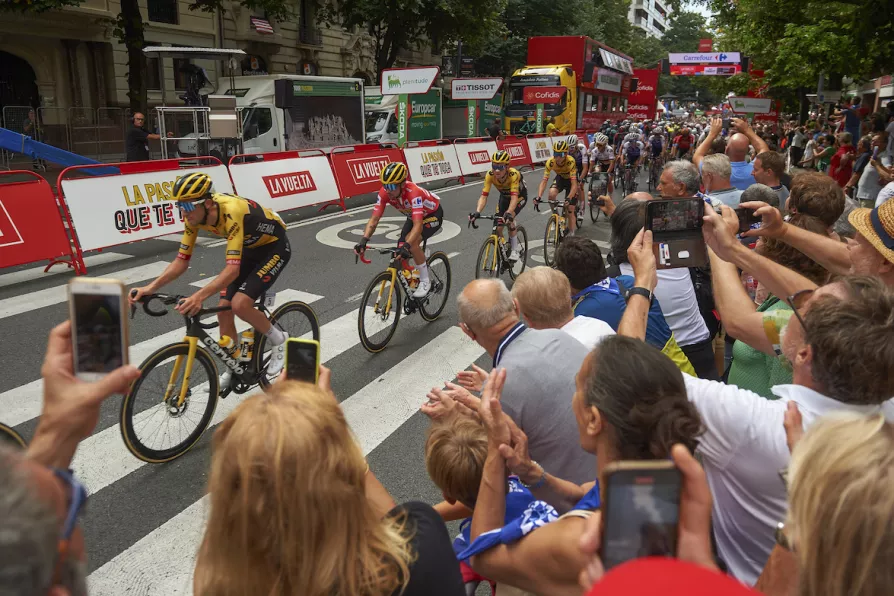Board members say ‘first priority’ under new ownership is to appoint head coach

 Riders cross the finish line of the 5th stage of the Vuelta cycling race between Irun and Bilbao, northern Spain, Wednesday, Aug. 24, 2022.
Riders cross the finish line of the 5th stage of the Vuelta cycling race between Irun and Bilbao, northern Spain, Wednesday, Aug. 24, 2022.
REMCO EVENEPOEL dropped his main challengers on the short but gruelling final ascent in Les Praeres to increase his overall lead in the Vuelta on Sunday.
South African flyweight Louis Meintjes, ideally built for the 20-plus per cent gradients, won the ninth stage, crossing the line more than a minute ahead of his breakaway companions Samuele Battistella, Edoardo Zambanini — and the irrepressible Evenepoel.
The Vuelta is the third and final leg of cycling’s annual grand tours, the Spanish equivalent of the Tour de France and Italy’s Giro d’Italia, a gruelling 21 stages over three weeks.
Evenepoel launched his attack about 1.8 miles from the summit to overpower his rivals and extend his lead ahead of today’s rest day and tomorrow’s time trial in Alicante.
The Belgian rider, still just 22, increased his lead over Enric Mas in the general classification from 28 seconds to 72 seconds overall.
His advantage over defending champion Primoz Roglic went up by more than 50 seconds to nearly two minutes.
The Slovenian Roglic, seeking an unprecedented fourth straight Vuelta title, was only 10th in Sunday’s stage, crossing the line 2.26 behind Meintjes.
Evenepoel got the help he needed from his team despite the surprise absence of Pieter Serry, who had to withdraw before the stage after testing positive for the coronavirus.
“I’m really impressed by my team,” Evenepoel said. “I’m so happy with the guys, it actually makes me a bit emotional seeing these guys working their hearts out for me. In a climb like this, it’s all about the power, there’s no drafting or anything because it’s too steep.”
Meintjes became the second South African stage winner in the Vuelta after Robbie Hunter in 1999 and 2001.
“It’s something special,” the 30-year-old climber said. “I’ve never been on the podium of a World Tour race except for a team classification, so that was one of my main goals before stopping my career.
“The last few days, I was just not quite fast enough in the mountain finishes. If I can’t get a result that way, the best was to go in the breakaway and it worked out perfectly.”
Meintjes moved to 16th in the general classification, nearly seven minutes off the lead.
Evenepoel’s domination of the event so far is another triumph of youth over experience: his only other time spent on one of the big three tours was in the 2021 Giro, which he did not finish, so he has still has to prove he has the legs to complete three weeks’ racing without having a bad day that might cost the win.
Nevertheless, recent grand tour results have favoured youth: the Colombian Egan Bernal won the Tour de France aged 22 in 2019, Slovenian Tadej Pogacar won the French race in 2020 at 22 and then again in 2021; Jonas Vingegaard of Denmark, who won this year in Paris, is almost a veteran at 25.
They are all victories from a new generation of bike racers who have ripped up the stage-race rule book by adopting a more aggressive, fearless approach that relies less on powerful teams and more on individual ability at crucial moments.
The tedious era of the Sky/Ineos “train” seems to be over, though Jumbo Visma have not only great individuals in Vingegaard and, in the current race, Roglic, but a colossally strong squad. That no longer guarantees wins, however.
Evenepoel is very much in the fearless mould, undaunted by mountain-top finishes and time trials alike.
It would be no surprise to see him further extend his lead tomorrow in Alicante. Whether he can last the full three-week course to Madrid on September 11, though, is anyone’s guess.